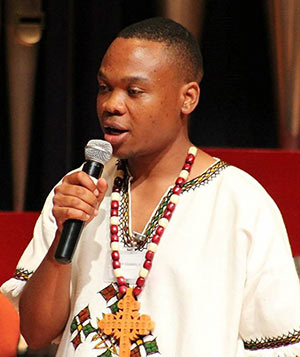
Towards the leading College of Law and Justice in Africa

Macdonald Rammala is the Community Engagement Coordinator of the College of Law, Unisa. He is project leader and lead researcher of the Lekgotla La Batho Research Project, which focuses on traditional courts in South Africa, an intercultural mediator (Bridges Academy, USA), social worker (Unisa), and Law scholar (Unisa). His current research is on social policy and traditional dispute resolution. In this manner, Rammala is involved with the traditional courts of various traditional councils in South Africa and with African scholars in an effort to revive the critical role that African Indigenous Law plays in modern society.
From 2015 to present, Rammala has been featured in various academic publications within and outside Unisa. He has shared knowledge with other scholars in both national and international stages, with the latest being in Abuja, Nigeria. The Indigenous Knowledge Systems of Africa are of great importance to this researcher. African indigenous Law remains as a critical ingredient in indigenous knowledge systems and it is up to scholars to revive or ignore this paradigm shift. We will be doing a great injustice if we overlook indigenous knowledge research because communities are part of academia and vice versa.
The current pandemic has brought in a radical and an unapologetic change to every aspect of our shared reality. Unisa is perceived as a beacon of focus in terms of ushering education that pushes through the obstacles that are put in place by the pandemic. In response to the diverse realities that community’s experience, the College of Law’s (CLAW) community engagement (CE) projects serve as the extended arm of the university in engaging on matters that serve a significant purpose in various communities. At the core of CE, we find people with unique ideas that enrich the archives of both formal and informal knowledge. At CLAW, legal education in communities is paramount and undeniably vital in sensitising, conscientising, and engaging our communities post the pandemic.
Among critical interventions required in communities is the need for legal education. Notwithstanding the measures put in place by the regulations to curb the spread, it is clear that there is a dire need for community legal education. It is disheartening to arrest a mother for selling atchar, the forced physical exercises that emanate from an unequal relationship between state law enforcement officials and citizens, immense poverty and non-spatial planning of informal settlements and townships that result in downtrodden streets serving as front yards (thereby confining people to dilapidated shacks),the extreme inequalities that result in people having to choose between starvation and abiding by the law, the selective deployment of forces in certain areas and the constitutionality of actions taken by these forces. It is, without a doubt, that communities require legal education and CE is well positioned to constructively engage on these critical community issues.
Community legal education is vital in enhancing the foundation for a democratic and open society in which government is based on the will of the people and every citizen is equally protected by the law. This brings to the fore the need to take the university to the people through legal community education.
This however, will indeed require a multi-inter and trans-disciplinary approach that recognises the need to speak to the aspirations, fears, hopes and realities of communities. It is not a one-size-for-all approach but a unique perspective that eliminates the hoarding of knowledge in favour of shared knowledge where it is mostly needed. From the Street Law Project to Community Safety Networks, from the Electoral Dispute Resolution Project to the Students Debates and Seminars Project, and many other fully functioning projects; CLAW’s CE projects are well suited to take legal knowledge to the people. Our students, our academics, researchers, current and future leaders are products of these communities. Therefore it is not a waste to engage our communities on legal education to further enhance their will as fully fledged members of our society.
This community legal education need not be against any measure put in place to assist after the pandemic. During these trying times, an incalculable effort should be exerted to the need to be able to reach communities through available and reasonable means that the university has access to. With these immense inequalities, it would be unsound for community projects to disregard communities in the dissemination of community legal education. This will not create overnight legal philosophers and/or rebellious lawyers but it would be an approach that speaks clearly of the African university in the service of humanity. Communities, wherever they are located, are more than just sites of knowledge, they are wells of knowledge. A well represents the hope of a people.
* By Macdonald Rammala, Community Engagement Coordinator, College of Law
Publish date: 2020-07-09 00:00:00.0